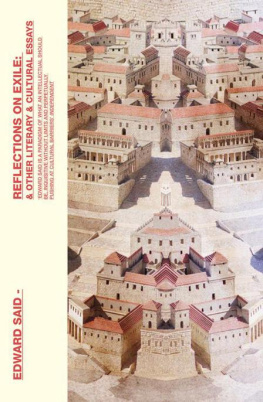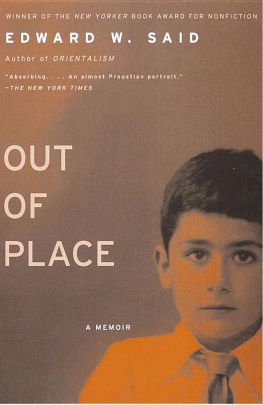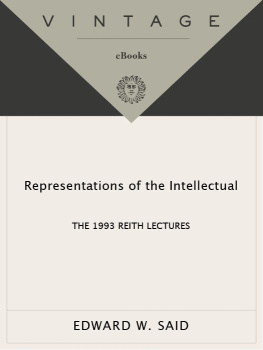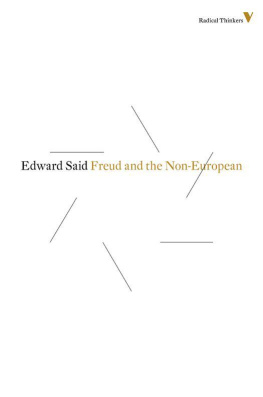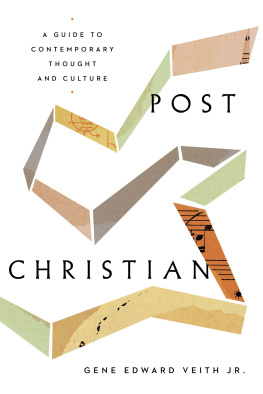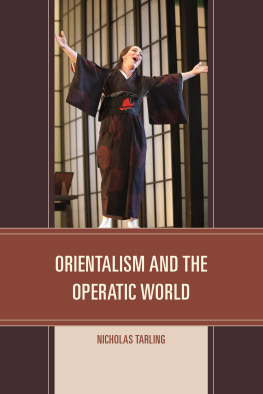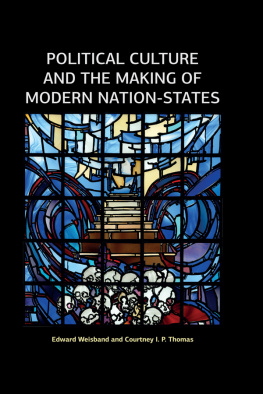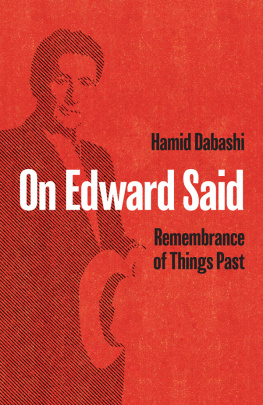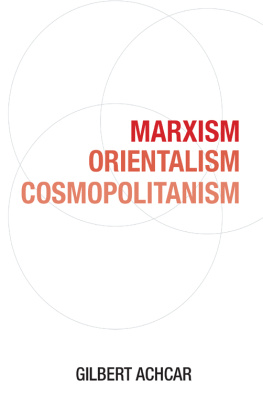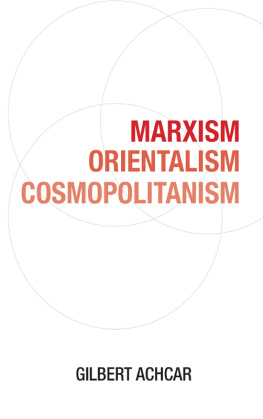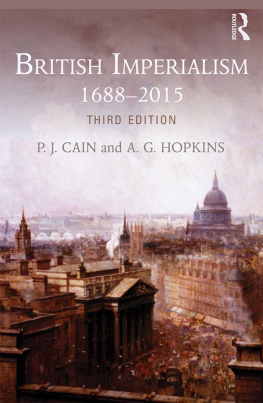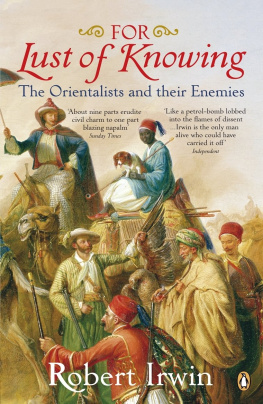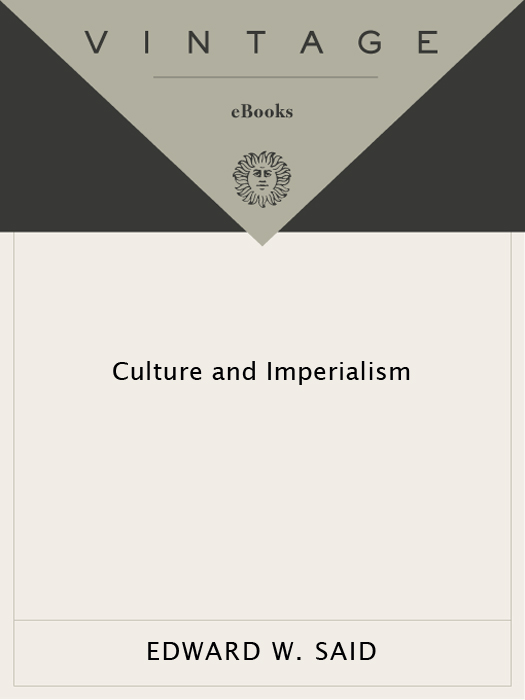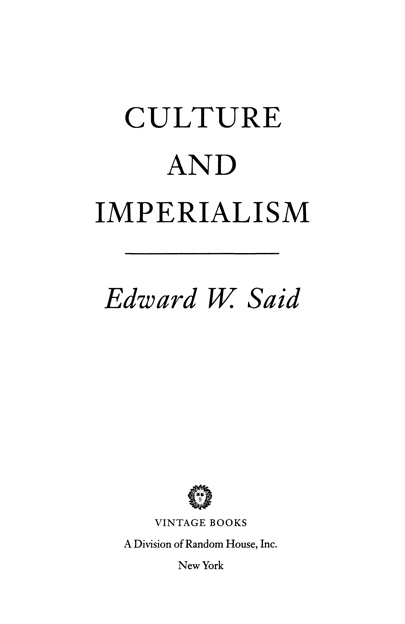An internationally renowned literary and cultural critic, Edward W. Said was University Professor at Columbia University and the author of more than twenty books, including Orientalism, which was nominated for the National Book Critics Circle Award. He died in 2003.
BOOKS BY Edward W. Said
Joseph Conrad and the Fiction of Autobiography
Beginnings: Intention and Method
Orientalism
The Question of Palestine
Literature and Society
Covering Islam
The World, the Text, and the Critic
After the Last Sky
Blaming the Victims: Spurious Scholarship
and the Palestinian Question
Musical Elaborations
Culture and Imperialism
FIRST VINTAGE BOOKS EDITION, JUNE 1994
Copyright 1993 by Edward W. Said
All rights reserved under International and Pan-American Copyright Conventions. Published in the United States by Vintage Books, a division of Random House, Inc., New York, and simultaneously in Canada by Random House of Canada Limited, Toronto. Originally published in hardcover by Alfred A. Knopf, Inc., New York, in 1993.
Portions of this work, in different versions, have appeared in Field Day Pamphlets, Grand Street, the Guardian, London Review of Books, New Left Review, Raritan, the Penguin edition of Kim, Race and Class, and Raymond Williams: Critical Perspectives, edited by Terry Eagleton.
Grateful acknowledgment is made to Harcourt Brace Jovanovich, Inc., and Faber and Faber Ltd., for permission to reprint Tradition and the Individual Talent from Selected Essays by T. S. Eliot, copyright 1950 by Harcourt Brace Jovanovich, Inc., and renewed 1978 by Esme Valerie Eliot.
Library of Congress Cataloging-in-Publication Data
Said, Edward W.
Culture and imperialism/Edward W. Said 1st Vintage Books ed.
p. cm.
Originally published: New York: Knopf, 1993.
eISBN: 978-0-307-82965-8
1. European literature History and criticism Theory, etc.
2. Literature History and criticism Theory, etc. 3. Imperialism in literature.
4. Colonies in literature. 5. Politics and culture.
I. Title.
[PN761.S28 1994]
809.894-dc20 93-43485
v3.1
For
Eqbal Ahmad
The conquest of the earth, which mostly means the taking it away from those who have a different complexion or slightly flatter noses than ourselves, is not a pretty thing when you look into it too much. What redeems it is the idea only. An idea at the back of it; not a sentimental pretence but an idea; and an unselfish belief in the ideasomething you can set up, and bow down before, and offer a sacrifice to.
J OSEPH C ONRAD , Heart of Darkness
Contents
CHAPTER ONE
OVERLAPPING TERRITORIES,
INTERTWINED HISTORIES
CHAPTER TWO
CONSOLIDATED VISION
CHAPTER THREE
RESISTANCE AND OPPOSITION
CHAPTER FOUR
FREEDOM FROM DOMINATION IN THE FUTURE
Introduction
A bout five years after Orientalism was published in 1978, I began to gather together some ideas about the general relationship between culture and empire that had become clear to me while writing that book. The first result was a series of lectures that I gave at universities in the United States, Canada, and England in 1985 and 1986. These lectures form the core argument of the present work, which has occupied me steadily since that time. A substantial amount of scholarship in anthropology, history, and area studies has developed arguments I put forward in Orientalism, which was limited to the Middle East. So I, too, have tried here to expand the arguments of the earlier book to describe a more general pattern of relationships between the modern metropolitan West and its overseas territories.
What are some of the non-Middle Eastern materials drawn on here? European writing on Africa, India, parts of the Far East, Australia, and the Caribbean; these Africanist and Indianist discourses, as some of them have been called, I see as part of the general European effort to rule distant lands and peoples and, therefore, as related to Orientalist descriptions of the Islamic world, as well as to Europes special ways of representing the Caribbean islands, Ireland, and the Far East. What are striking in these discourses are the rhetorical figures one keeps encountering in their descriptions of the mysterious East, as well as the stereotypes about the African [or Indian or Irish or Jamaican or Chinese] mind, the notions about bringing civilization to primitive or barbaric peoples, the disturbingly familiar ideas about flogging or death or extended punishment being required when they misbehaved or became rebellious, because they mainly understood force or violence best; they were not like us, and for that reason deserved to be ruled.
Yet it was the case nearly everywhere in the non-European world that the coming of the white man brought forth some sort of resistance. What I left out of Orientalism was that response to Western dominance which culminated in the great movement of decolonization all across the Third World. Along with armed resistance in places as diverse as nineteenth-century Algeria, Ireland, and Indonesia, there also went considerable efforts in cultural resistance almost everywhere, the assertions of nationalist identities, and, in the political realm, the creation of associations and parties whose common goal was self-determination and national independence. Never was it the case that the imperial encounter pitted an active Western intruder against a supine or inert non-Western native; there was


